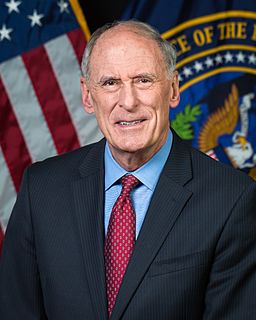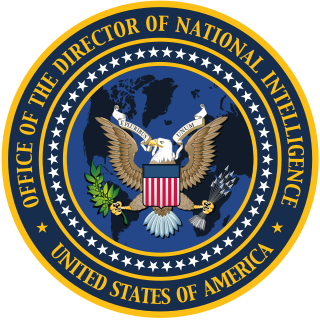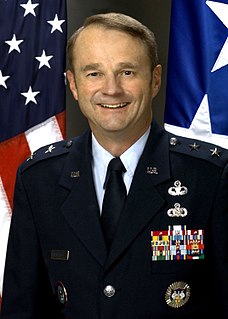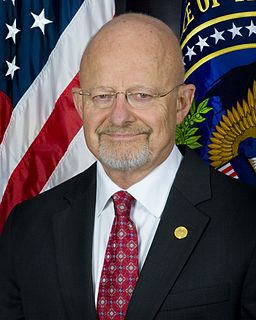Related Research Articles

Daniel Ray Coats is an American politician and former diplomat. From 2017 to 2019, he served as the Director of National Intelligence in the Trump administration. A member of the Republican Party, he served as a United States Senator from Indiana from 1989 to 1999 and again from 2011 to 2017. He was the United States Ambassador to Germany from 2001 to 2005, and a member of the United States House of Representatives from 1981 to 1989. Coats served on the United States Senate Select Committee on Intelligence while in the U.S. Senate.

The director of national intelligence (DNI) is a United States government Cabinet-level official, required by the Intelligence Reform and Terrorism Prevention Act of 2004 to serve as head of the United States Intelligence Community and to direct and oversee the National Intelligence Program (NIP). The DNI also serves, upon invitation, as an advisor to the president of the United States and the executive offices of the National Security Council and the Homeland Security Council about intelligence matters related to national security. The DNI produces the President's Daily Brief (PDB), a top-secret document including intelligence from all the Intelligence Community agencies, given each morning to the President.

John Michael McConnell is a former vice admiral in the United States Navy. During his naval career he served as Director of the National Security Agency from 1992 to 1996. His civilian career includes serving as the United States Director of National Intelligence from 20 February 2007 to 27 January 2009 during the Bush administration and seven days of the Obama administration. He is currently Vice Chairman at Booz Allen Hamilton.

The United States Intelligence Community (IC) is a group of separate United States government intelligence agencies and subordinate organizations, that work separately and together to conduct intelligence activities to support the foreign policy and national security of the United States. Member organizations of the IC include intelligence agencies, military intelligence, and civilian intelligence and analysis offices within federal executive departments.

The director of the Central Intelligence Agency (D/CIA) is a statutory office that functions as the head of the Central Intelligence Agency, which in turn is a part of the United States Intelligence Community.

The National Counterterrorism Center (NCTC) is a United States government organization responsible for national and international counterterrorism efforts. It is based in Liberty Crossing, a modern complex near Tysons Corner in McLean, Virginia. NCTC advises the United States on terrorism.

Dennis Cutler Blair is the former United States Director of National Intelligence and is a retired United States Navy admiral who was the commander of U.S. forces in the Pacific region. Blair was a career officer in the U.S. Navy and served in the White House during the presidencies of both President Jimmy Carter and President Ronald Reagan. Blair retired from the Navy in 2002 as an Admiral. In 2009, Blair was selected as President Barack Obama’s first Director of National Intelligence, but after a series of bureaucratic battles, he resigned on May 20, 2010.

Joseph Maguire is an American officer who served as Director of the National Counterterrorism Center and Acting Director of National Intelligence under President Donald Trump. He retired from the United States Navy as a Vice Admiral in 2010 after 36 years of military service. Prior to retiring from active duty, he was the Deputy Director for Strategic Operational Planning at National Counterterrorism Center (NCTC).

The Central Intelligence Agency, known informally as "The Agency" and "The Company", is a civilian foreign intelligence service of the federal government of the United States, officially tasked with gathering, processing, and analyzing national security information from around the world, primarily through the use of human intelligence (HUMINT). As a principal member of the United States Intelligence Community (IC), the CIA reports to the Director of National Intelligence and is primarily focused on providing intelligence for the President and Cabinet of the United States.

The under secretary of defense for intelligence or USD(I) is a high-ranking civilian position in the Office of the Secretary of Defense (OSD) within the U.S. Department of Defense that acts as the principal civilian advisor and deputy to the secretary of defense and deputy secretary of defense on matters relating to military intelligence. The under secretary is appointed from civilian life by the president and confirmed by the Senate to serve at the pleasure of the president.

Dr. Dale W. Meyerrose, Major General (Retired) was the first President-appointed, Senate-confirmed Associate Director of National Intelligence/Intelligence Community Chief Information Officer (CIO) and Information Sharing Executive for the Director of National Intelligence (DNI).
The Director of National Intelligence Open Source Center (OSC) was the previous name of a U.S. intelligence center located in Reston, Virginia, which provides analysis of open-source intelligence materials, including gray literature, through OSC's headquarters and overseas bureaus. Established on November 1, 2005, by the Office of the Director of National Intelligence, OSC is tasked with improving the availability of open sources to intelligence officers and other government officials. OSC provides material to the National Technical Information Service (NTIS) and other government officials through the online news service World News Connection. On October 1, 2015, the OSC changed its name to Open Source Enterprise and was absorbed into the CIA's Directorate of Digital Innovation.

Intellipedia is an online system for collaborative data sharing used by the United States Intelligence Community (IC). It was established as a pilot project in late 2005 and formally announced in April 2006. Intellipedia consists of three wikis running on the separate JWICS (Intellipedia-TS), SIPRNet (Intellipedia-S), and DNI-U (Intellipedia-U) networks. The levels of classification allowed for information on the three wikis are Top Secret Sensitive Compartmented Information, Secret (S), and Sensitive But Unclassified information, respectively. Each of the wikis is used by individuals with appropriate clearances from the 16 agencies of the US intelligence community and other national-security related organizations, including Combatant Commands and other federal departments. The wikis are not open to the public.

Mary Margaret Graham was the United States Deputy Director of National Intelligence for Collection (2005–2008).

The National Counterintelligence and Security Center (NCSC) leads national counterintelligence (CI) for the United States government. It is part of the Office of the Director of National Intelligence (ODNI).

James Robert Clapper Jr. is a retired lieutenant general in the United States Air Force and is the former Director of National Intelligence. Clapper has held several key positions within the United States Intelligence Community. He served as director of the Defense Intelligence Agency (DIA) from 1992 until 1995. He was the first director of defense intelligence within the Office of the Director of National Intelligence and simultaneously the Under Secretary of Defense for Intelligence. He served as the director of the National Geospatial-Intelligence Agency (NGA) from September 2001 until June 2006.
The National Intelligence Strategy of the United States of America (NIS) is a product of the Office of the Director of National Intelligence (DNI). Drafted and implemented in 2005 while John Negroponte served as the DNI, it describes the drastic overhaul the United States (US) intelligence community will carry out. According to this strategy, the US intelligence community will create a new system for sharing information, while integrating its existing enterprises to meet its mission objectives and enterprise objectives. The changes to the intelligence community, including changes in tasking, derive from the 2002 US National Security Strategy. The legal basis for the new strategy is derived from the Intelligence Reform and Terrorism Prevention Act of 2004.

The United States intelligence budget comprises all the funding for the 16 agencies of the United States Intelligence Community. These agencies and other programs fit into one of the intelligence budget's two components, the National Intelligence Program (NIP) and the Military Intelligence Program (MIP). As with other parts of the federal budget, the US intelligence budget runs according to the Fiscal year (FY), not the calendar year. Before government finances are spent on intelligence, the funds must first be authorized and appropriated by committees in both the United States House of Representatives and the United States Senate.

The National Counterproliferation Center (NCPC) is the primary organization within the United States Intelligence Community for combating the spread of weapons of mass destruction and their delivery systems.

In the United States the Associate Director of National Intelligence and Chief Information Officer is charged with directing and managing activities relating to information technology for the Intelligence Community (IC) and the Office of the Director of National Intelligence (ODNI). The IC CIO reports directly to the Director of National Intelligence (DNI). John Shermanassumed the position of IC Chief Information Officer effective September 11, 2017.
References
- ↑ "United States Intelligence Community 500 Day Plan for Integration and Collaboration," Archived 2007-10-26 at the Wayback Machine DNI, October 10, 2007
- ↑ "In new 500-day plan, ODNI previews the future," Jason Miller, FCW.com, October 11, 2007